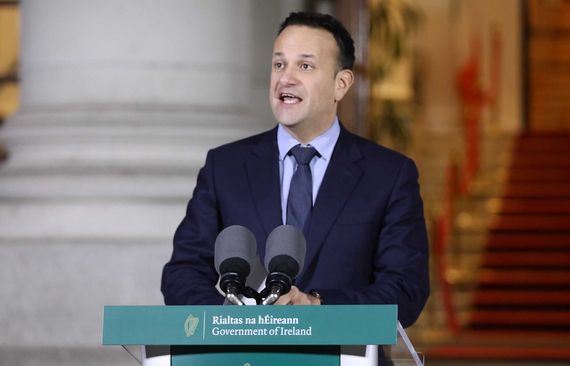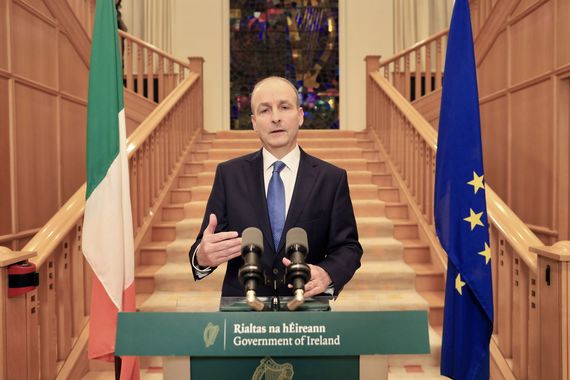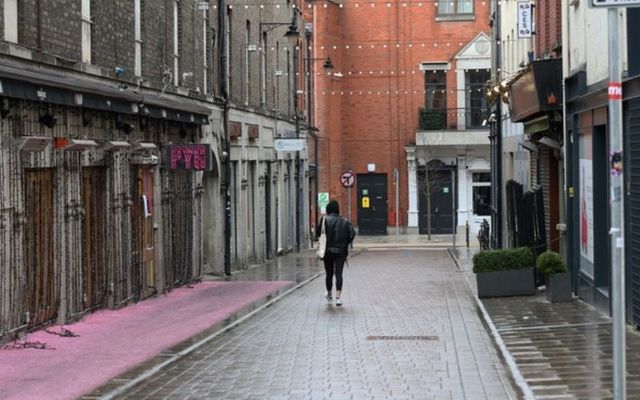It is almost ten months to the day since Leo Varadkar announced Ireland's first coronavirus lockdown to deal with the rapid spread of the relatively unknown virus. Now, almost one year after the first COVID-19 case was reported in Ireland, the country is enduring its third lockdown amid a culture of blame as tolerance begins to wear thin.
Varadkar addressed the nation on March 26 last year to announce a total shutdown of the country, closing all bars, restaurants, and nightclubs, while also shutting down schools, construction projects, and non-essential retail while confining Irish people to within 2km of their own home.
There was almost widespread compliance. Zoom quizzes and virtual bingo sessions quickly became the new norm as Irish people displayed unprecedented levels of community solidarity to do their part and "flatten the curve" by "uniting by staying apart" and any other nauseating PR slogan that was being touted at the time.
There was a caveat, however. Varadkar announced the shutdown for two weeks to stop the spread of the virus and while no one believed that the restrictions would last for two weeks, there were very few people who expected them to be in place for the long-term.

Leo Varadkar giving an address on COVID-19.
Varadkar had essentially dangled a carrot in front of the Irish people, promising a quick fix to this public health crisis that they still knew very little about. Ignorance is bliss.
Restrictions, of course, were not lifted after two weeks as cases, hospitalizations, and deaths continued to rise.
Read more
When Leo Varadkar addressed the nation at Easter, however, he again announced a further two weeks of restrictions and so Irish people continued to play their part.
Varadkar's announcement coincided with a period of fine, balmy spring weather, precipitating a significant rise in family barbeques and outdoor meals and in reality, a lot of people probably enjoyed that first lockdown.
A brief return to normal
When Varadkar appeared in front of cameras two weeks later to announce a further two weeks of restrictions, his announcement was accompanied by the introduction of a phased re-opening of the Irish economy.
By July, almost all sectors would reopen at some capacity, excluding nightclubs, and life returned to as close to normal as it has done since the pandemic reached Irish shores last February.
Yes, people were asked to wear masks and leave their contact details when they ate in a restaurant, but they could still meet with friends or loved ones without fear or guilt as daily cases of the virus finally reached single digits.
It seemed to many that the pandemic was at an end, making all future restrictions and lockdowns all the more unbearable.
This current lockdown, for instance, is far less restrictive than the lockdown last spring, but it feels far more smothering for many people and there is a multitude of reasons for this.
Current restrictions allow people to exercise within 5km of their own home as opposed to 2km in the first lockdown, but that is precious little to celebrate.
In fact, Irish people have now been asked to stay within 5km of their own home for five of the last ten months.
No end in sight
There is no sign of a finish line at present either. While Leo Varakdar announced two-week shutdowns, current Taoiseach Micheál Martin has introduced month-long restrictions at the very least during his reign.

Michael Martin delivering bad news of another lockdown.
There is a consensus that the Level 5 restrictions will not be lifted on January 31 and that Martin will instead announce at least another month of restrictions. While Martin's approach is clearly more honest and realistic than Varadkar's bi-weekly updates, it also chips away at people's enthusiasm and happiness.
It is likely to be mid-March before people can travel more than 5km of their home for non-essential purposes without fear of persecution, meaning that seven of the last 12 months will have spent walking or running the same streets by the time light starts to emerge at the end of this very long and dark tunnel.
This is now the third lockdown that Irish people have endured - a far cry from the two weeks Leo Varakdar promised in March. The constant oscillating and toing and froing between lockdown and semi-lockdown have fostered a feeling of pointlessness. There is almost no point in reopening the country anymore when it is just going to be shut down again anyway, leading people to perhaps rightfully believe that their efforts will amount to nothing.
The Irish Government introduced its "Living With COVID" plan in September; all it's been doing ever since has been hiding from it. It's difficult for people to be enthusiastic about falling case numbers when everything of value has been taken away from them indefinitely.
The sense of community solidarity that carried a lot of people through the first lockdown has also long since dissipated.
Gone are the days of Zoom quizzes and clapping for healthcare workers as an incipient sense of listlessness and pointlessness builds among a significant portion of Irish people.
Passing the buck
It's hard to blame them. The vast majority of Irish people have followed Government guidelines to the letter over the past ten months only to be berated and belittled by an unelected Chief Medical Officer every night for not doing enough.
People aged 19-24 have come in for particularly heavy criticism for spreading the virus more widely than other age groups, but medical experts have failed to consider that a large percentage of 19-24-year-old's are teachers or nurses essential retail workers who put themselves at risk of contracting the virus by simply going to work.
Temple Bar, Dublin, empty during lockdown.
Blaming people by launching scathing attacks against their character is going to do nothing for their morale and it is simply an attempt to pass the buck along.
The buck should have stopped with the Government and the medical experts long ago, but it hasn't.
For too long, people arriving at Dublin Airport were merely required to fill out a Passenger Locator Form and promise to self-isolate for two weeks. Many didn't.
Arriving travelers should have been taken to one of the many hotels that had been rendered useless during the lockdowns and forced to remain there for two weeks. They weren't.
More than 30,000 people arrived in Ireland from Britain in December - 1,444 arrived after the Irish Government banned flights from Britain on December 21. None were required to quarantine or present a negative PCR test, despite Britain being a COVID hotspot with a more infectious strain of the virus.
It is easy to see how cases spiraled out of control over Christmas, but the Government and public health officials again chose to blame people for being irresponsible.
Furthermore, it is also easy to see why people have lost that sense of solidarity that was so inherently evident during the first lockdown and why articles announcing new restrictions or new daily cases have been met with waspish and divisive comments.
Why should do their part when they're going to be blamed anyway? Why should friends or loved ones stay apart when those with more power won't take responsibility for their mistakes.
This has been one of the most difficult years in many people's lives; people have struggled with fitness and weight gain and with depression and anxiety in addition to many other issues. To then shift the blame away from the people with the power and influence to control the spread of the virus onto people who have shouldered the financial burden of the pandemic has a telling effect on their mental health and their willingness to comply with restrictions.
Even still, this wretched combination of factors might have been bearable for most people had the third lockdown not taken place in January.
The first month of the year is typically the most depressing for most people. What with New Year's resolutions and attempts to shed the Christmas pounds, people tended to socialize far less in January even in pre-pandemic times.
A combination of the dark nights, cold weather, and post-Christmas blues make January a difficult and lonely month for many at the best of times; add in a never-ending lockdown and it becomes depressingly unbearable for anyone whose mental health has been crippled in the past ten months.




Comments